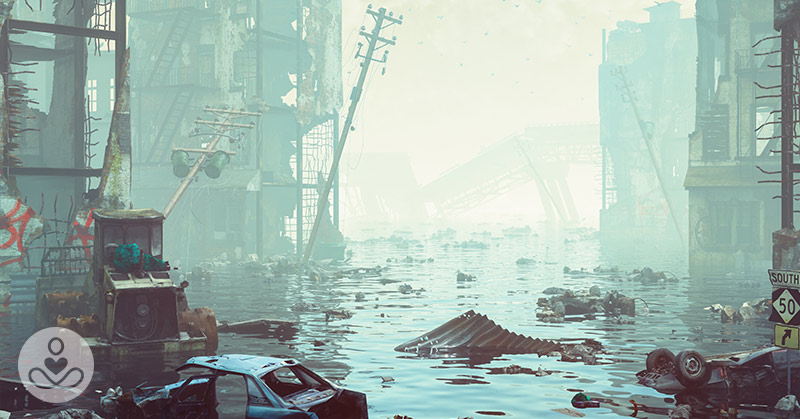Another week, another harrowing headline. Have you heard? According to, Ian Dunlop, a former fossil fuel executive, and David Spratt, a climate researcher, a new report suggests that human civilization may come to an end in the year 2050.
In late May 2019, the independent climate-focused think tank Breakthrough National Centre for Climate Restoration in Melbourne, Australia, voiced their concern — namely, scientists are vastly underestimating the impact climate change can and will have on our planet.
What’s more, the impending consequences may occur much sooner than expected. So much so that the paper’s authors describe climate change as “a near- to mid-term existential threat to human civilization.” (1)
One of the major reasons why Dunlop and Spratt believe the current climate crisis is worse than it’s being portrayed is because it doesn’t account for numerous interlinked geological processes.
Remember the Intergovernmental Panel on Climate Change’s 2018 climate change report? The UN-commissioned report claimed that we have just over a decade to limit global warming to 2.7 degrees Fahrenheit — or 1.5 degrees Celsius. (2)
In our article World One: A Computer That made a Doomsday Prediction in 1973 Could Be Right, we highlighted the fact that “with over 133 authors drawing from 6,000+ peer-reviewed scientific papers, the consensus is that — without a doubt — global warming needs to be reigned in.”
Related: How Global Warming and Mind-Eating Parasites Are Creating a Global Intelligence Gap
Is it possible to manage this climate change risk?
Umair Irfan, an environmental staff writer for Vox, outlined a number of devastating things that could occur with a 0.5 degree Celsius increase in global warming: (3)
- Marine fisheries would face double the declines
- Maize harvests would decrease by more than double
- Insects would see their ranges decline threefold (including vital pollinators)
- Sea levels would rise another two inches (causing coastal flooding for 10 million more people)
Dunlop and Spratt write:
“Because the consequences are so severe — perhaps the end of human global civilization as we know it — ‘even for an honest, truth-seeking, and well-intentioned investigator it is difficult to think and act rationally in regard to… existential risks.’”
According to their report, the only scenario to prevent the collapse of civilization from happening would be “akin in scale to the World War II emergency mobilization.”
Chris Barrie, a retired admiral and former defense forces chief of Australia, claims that “after nuclear war, human-induced global warming is the greatest threat to human life on the planet.”
Don’t mistake size for significance
While a two-degree Celsius warming doesn’t seem like a lot, it would result in hundreds of millions — if not billions — of people relocating due to unlivable conditions and scarcity of water supplies.
“More than a billion people may need to be relocated and in high-end scenarios, the scale of destruction is beyond our capacity to model, with a high likelihood of human civilization coming to an end.”
Related: Nature Is Speaking — Julia Roberts Voices ‘Mother Nature’ in Stark Reminder
Is there a solution?
Hopefully. In Dunlop and Spratt’s report, they list a few ways to reduce climate change risks and sustain human civilization.
“It is essential to build a zero emissions industrial system very quickly. This requires the global mobilization of resources on an emergency basis, akin to a wartime level of response… The national security sector has unrivaled experience and capacity in such mobilization, and can play a unique role in its development and implementation, as well as educating policymakers of the existential security risks in failing to do so.”
Here’s hoping the people in power make the right choices.

